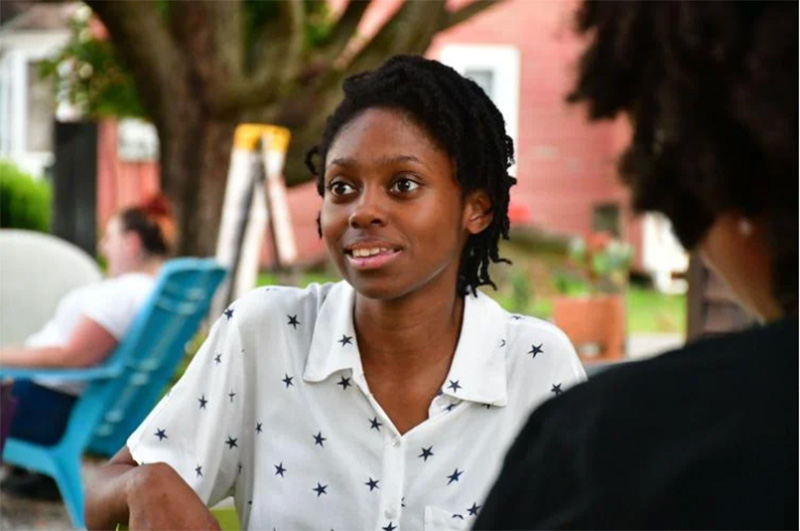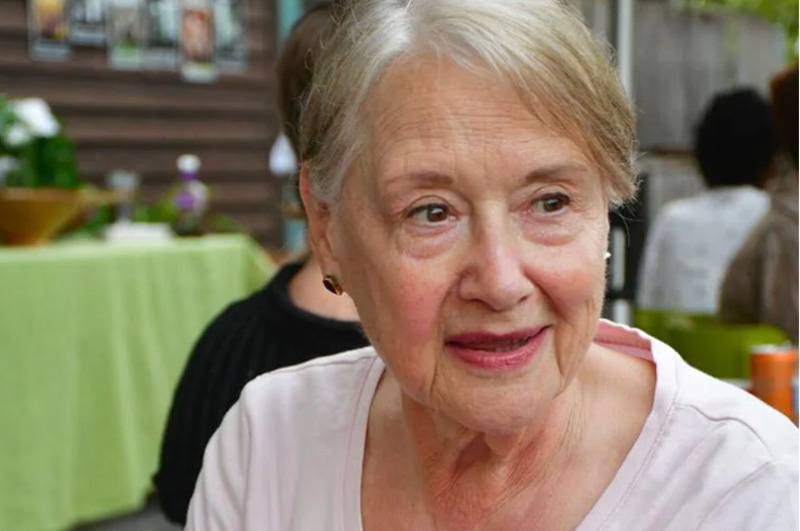September 13, 2023
Berkshire Eagle
‘If I can get my story out there, it could help another young woman who’s going the wrong route’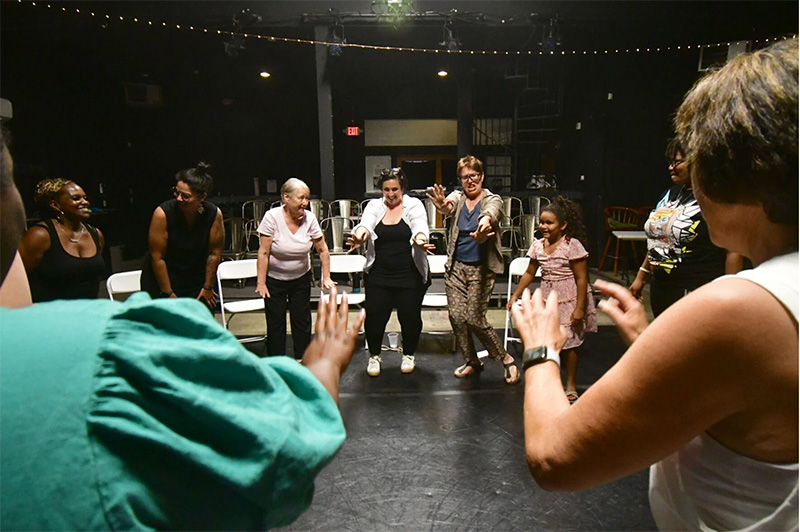
Throughout the monthslong process of developing the theater piece, women from 2nd Street participated in a series of storytelling workshops that helped shaped the piece.
WEST STOCKBRIDGE, Mass. — One recent afternoon, a group of actors met the women whose stories inspired their newest work of art.
The group, 14 strong, sat in a circle at The Foundry, where rehearsals have taken place over the past two weeks. They all introduced themselves, cracking jokes and sharing snippets of their lives, their traumas and their triumphs, and what led them to this moment.
“A lot of us have been through some things in our life that many did not make it out of,” said Mimi Nicholson, a participant in a support group for women who have been involved in the justice system that is run through Second Street, Second Chances. Known as 2nd Street, the organization provides services to formerly incarcerated men and women in the county.
Nicholson has been attending the group for about a year, drawing strength from and lending support to her peers, five of whom sat with her in the circle in The Foundry’s black box theater space that evening.
They are the women whose biographies inspired the theater piece, “Release,” which will have a three-show run and premieres at the Robert Boland Theatre in the Koussevitzky Arts Center at Berkshire Community College on Wednesday, Sept. 20. The performance, free to attend, speaks to issues surrounding incarceration, and is the companion initiative to “Insight Out,” an exhibition of visual art by currently and formerly incarcerated artists on view at the Berkshire Museum through Oct. 1.
“We’ve been through so many ups and downs and addictions and afflictions,” Nicholson continued. “I’m thankful to have all of us working together as a group — iron sharpens iron.
“Brittany Nicholson, her daughter, sat next to her. She is one of the five actors who are involved in the project, having been recruited to participate by co-directors Sara Katzoff, a professor of theater at Bard College at Simon’s Rock, and Amy Brentano, founder of The Foundry.
Katzoff and Brentano developed the skeleton of the script. To do so, Mimi Nicholson, as well as the five other women from the aftercare group — Kristen Acetta, Tiffany Broulette, Katelynn Goodwin, Gabby Leon and Vivian Singh — sat for lengthy interviews about their lives.
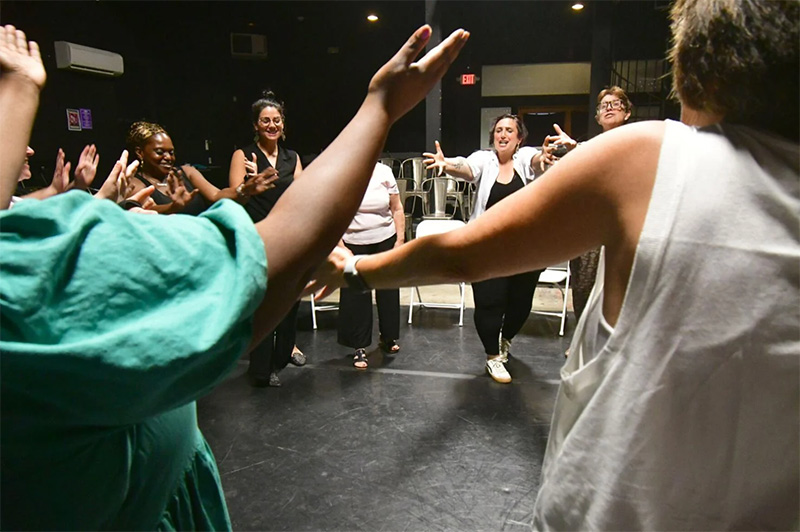
Sara Katzoff and Amy Brentano, second and third from right, work with a collective of formerly incarcerated women and theater artists. “Release,” a collaboration of 2nd Street Second Chances will be presented at Berkshire Community College.
Transcriptions of those interviews were provided to the actors who helped develop the script over the course of all-day rehearsals.
The transcripts were anonymous, so the actors didn’t know whose life stories they were reading. But for Brittany, it wasn’t hard to recognize her mother’s stories as she studied the material. However, the characters aren’t exact depictions of the individual women. Rather, they contain aspects of each, in service of both protecting the women’s privacy, as well as evoking and conveying themes of motherhood, recovery, loss, struggle and triumph, Katzoff said.
“They’re their words, but they’re coming through us,” said Joan Coombs, one of the actors involved in the production.
Growing up, Mimi Nicholson’s life wasn’t easy. To seek respite she ran away often as a youth, looking for the love she was missing at home, but fell victim to sexual violence. She didn’t talk about what happened to her — she internalized it and felt ashamed. But she tells her story now, as a survivor, in the hopes that it reaches young women and girls who find themselves in a similarly vulnerable position.
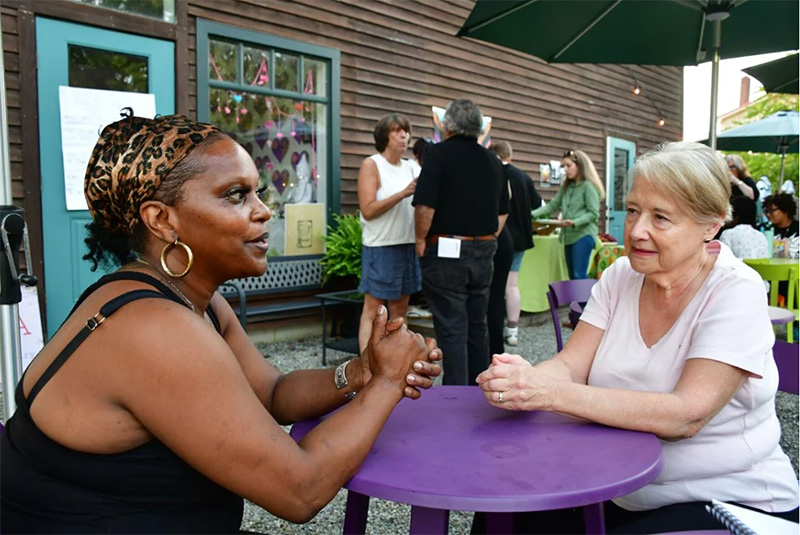
Mimi Nicholson and actor Joan Coombs chat during a meet and greet at The Foundry in West Stockbridge. “A lot of us have been through some things in our life that many did not make it out of,” Nicholson said.
“If I can get my story out there, it could help another young woman who’s going the wrong route,” she said.
Brittany Nicholson hopes the performance, inspired by her mother’s journey as it was, will prove therapeutic. “Theater is a very healing thing,” she said.
Throughout the monthslong process of developing the piece, women from 2nd Street also participated in a series of storytelling workshops, which Singh said helped clarify their personal narratives.
It’s those stories that Singh hopes the audience will internalize.
“We’re people, and we’re women, and we have stories. There aren’t a lot of projects for us, especially like this,” she said.
She sat at a table with actor Zurie Adams. Brentano and Katzoff had organized a dinner for the women outside after their initial meeting in the studio. They were split into pairs — one actor with one of the women’s group participants. Ice breaker questions were supplied, but largely unneeded as the conversation flowed and the sun set over West Stockbridge.
A thread emerged. For many of the women, this performance marked the first time that their ruminations about their lives — what they’ve already been through and what they’re working toward — have been drawn out and studied, appreciated and retold.
